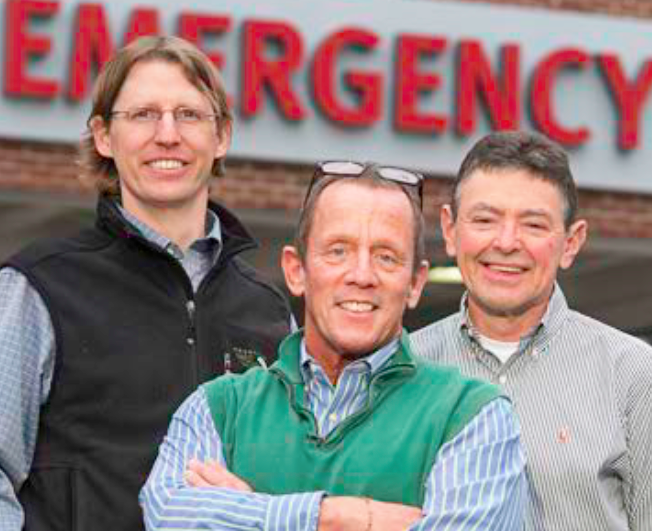The Power of Shared Experience
Pictured from left: Christopher “Crick” Watkins, Bob Richardson and Terry Cox.
By Wayne Mogielnicki
There’s a new level of care in Wake Forest Baptist Medical Center’s Emergency Department (ED).
To better serve patients who exhibit both obvious and less-apparent signs of substance abuse or mental health issues, the ED currently has two full-time peer support specialists with strong credentials for the job: personal experience.
“I can be a good example or a horrible warning,” says Bob Richardson, a one-time alcoholic who has been sober since 1997. He and Terry Cox are the peer support specialists who have been working in Wake Forest Baptist’s ED since August.
“As we identify these patients, Bob and Terry, with their shared experience, are able to find common ground with them more easily than we as providers can,” says Christopher “Crick” Watkins, DO, an emergency medicine physician at Wake Forest Baptist. “They can bridge the gap in a non-judgmental way and open an avenue of communication to help a patient identify that they might have a problem, but more importantly to let them know that there is hope and opportunity for recovery.”
They define the support
That counsel doesn’t come in a one-size-fits-all package, though.
“Often times I won’t even bring up the idea of substance abuse with the patient,” says Richardson, who has done peer support since 2005. “I just say that I’m there to support them, and they get to define that. Over the course of time, I’ve gotten pretty good at figuring out whether to go right in like a bull in a china shop or be a little more subtle.”
There is a peer support specialist on duty in the ED from 8 a.m. to 10 p.m. Monday through Friday, with Richardson and Cox alternating day and night shifts. Their work isn’t limited to the confines of the hospital; they also provide follow-up support to help the patients navigate the ins and outs of the recovery process.
Filling a gap
Providing peer support in emergency departments is not a new concept, but “across the country it’s still pretty rare,” Watkins says.
At Wake Forest Baptist, the idea was introduced “a few years ago” by Steve Scoggin, associate vice president of behavioral health and president of CareNet Inc. “I saw it as filling a gap in our care model,” Scoggin says.
A grant to Wake Forest Baptist from the Hanley Family Foundation is funding the salaries of four peer support specialists — two specialists work with Medical Center inpatients — for one year.
“The grant has two specific goals,” Watkins says. “One is to reduce recurring visits by patients with substance-use disorders, particularly alcohol. The other is to permanently establish peer support specialists within the culture of how we provide care here.
—Wake Forest Baptist HealthWire

